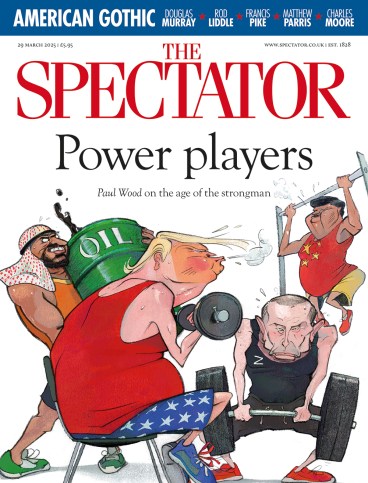
Not zero
Sir: I was delighted to see your leading article about the impossibility of net zero (‘Carbon candour’, 22 March). We need now to expose its futility. The UK’s efforts will make no difference at all to global temperature. Whether it is naturally occurring or produced through coal burning, there is not the slightest chance of stopping the rise in atmospheric carbon dioxide (not ‘carbon’, which is nasty black stuff).
Guy Liardet
Meonstoke, Hampshire
Ideological bullets
Sir: ‘Don’t bite the hand that feeds you’, they say. But by biting the hand of business with her Budget, Rachel Reeves has shown total recklessness (‘The Rachel capers’, 22 March). By killing growth, she is now paying the heavy price for this both economically and politically. It was intriguing to see the very measured former governor of the Bank of England (and Reeves’s former boss), Mervyn King, being interviewed by Sophy Ridge on Sky News about her mistakes. His conclusion was that she lacked experience of economic policy and a plan for the parliament. During 14 years of opposition, Labour could have really developed an idea for their economic policy. Instead, it appears they are just shooting from the hip with ideological bullets that end up hitting the wrong targets, killing large sectors of the economy and injuring many of the most vulnerable in society. As they now reload with the Spring Statement, it seems more people will need to take cover.
Andrew Haynes
London SW6
Going to extremes
Sir: I was intrigued by Marcus Walker’s article in which he suggests that the civil wars of the 17th century ‘inoculated’ our political system against ‘extremes’ (‘Cavalier approach’, 22 March). I am not so sure the vaccine was completely successful. Within 25 years of the restoration we had the Monmouth Rebellion, closely followed by the Glorious Revolution of 1688, complete with a Dutch invasion. Then the various Jacobite rebellions, along with the rather successful revolt of His Majesty’s subjects in the American colonies. And of course the various civil disturbances of the late 18th and early 19th century, such as Captain Swing, the Luddites, the Rebecca Riots etc; all requiring the deployment of the army. Once Ireland had been integrated into the United Kingdom we had various activities of the Fenians; a sort of strike by the British army’s cavalry regiments, the arming of various political factions followed by an uprising and a guerrilla war taking us into a steady drumbeat of IRA terrorism throughout the last century. If anything, post-1660 events prove that extremism was alive and well and was frequently the way in which often seemingly intractable political and social problems were resolved. Finally, current editor take note, I forgot Bothwell Bridge and dealing with those pesky Scottish Presbyterians!
Jonathan Moore
Harrow, London
Bonn’s Bard
Sir: Shakespeare’s status as England’s national poet is more in peril than Douglas Murray realises (‘Something is rotten in Stratford-upon-Avon’, 22 March). Indeed, it has been ever since the publication in the 19th century of the magnificent Schlegel-Tieck German translation of his works. Since then he has been fondly known as ‘unser Shakespear’ (our Shakespeare) in the Fatherland; and, so ’tis said, his plays are more performed there than in England. Very well: given the betrayal of his heritage by those in Stratford, moving the trust and its assets to Bonn is the obvious solution.
Revd Dr Peter Hatton
Sea Mills, Bristol
Game of the name
Sir: Though not strictly practitioners of nominative determinism (Letters, 22 March), the Foreign Office personnel department in the 1950s did put together in the same rooms Downing and Street, Comfort and Joy, and, all in one department, Scarlett, Pink, Brown and Rose.
David Lane
London W1
Expert insult
Sir: I found the insults recounted by your writers (Spectator Schools, 15 March) mild in comparison with my form master John Heath’s, at Dulwich College. In my report he wrote: ‘He works like a bulldozer, pushing all before him, but he can be strangely frivolous at times and, I’m afraid, he is sickeningly competitive.’ Aged 13 and already indoctrinated in the school’s fiercely academic principles, I was mortified and it still hurts me to recall his words 50 years on.
Stephen Barber
London W2
Sound in silence
Sir: Speaking of memorising music (Letters, 22 March), the conductor Eugene Ormandy, who died in 1985, was asked in a BBC interview if he had to choose between the loss of his sight or the loss of his hearing, which it would be. Surprisingly, he replied the loss of his hearing, for he would still be able to read the scores, of which he knew 3,000.
Roger Wild
Scarborough
The 8 a.m. scramble
Sir: I’m afraid Martin Vander Weyer will be disappointed in thinking that online GP appointments mean the end of the ‘8 a.m. scramble’ (Any other business, 15 March). We’ve been able to make online appointments for some time, but the scramble is now worse. The system opens at precisely 8 a.m., and the prize goes to those who can go through the options at speed and never make an error. If you’re not dexterous, are under the weather or have a slow internet connection, best of luck.
John O’Donnell
West Mersea, Essex







Comments